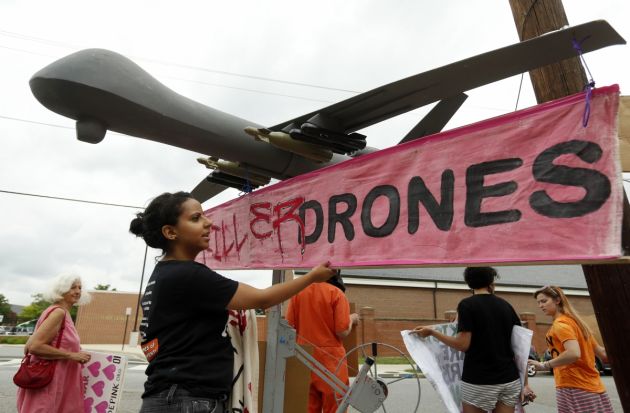UN expert calls for global halt to use of lethal drones

A United Nations expert on extrajudicial and arbitrary executions has called for a global stop to the development and deployment of lethal autonomous robots.
Christoph Heyns, a United Nations Special Rapporteur said the halt on use of LARs should be made to allow "serious and meaningful international engagement on this issue before we proceed to a world where machines are given the power to kill humans."
His report was presented to the United Nations Human Rights Council in Geneva on May 30.
Remotely-piloted aircraft, known as drones are increasingly used for targeted killings in U.S. counterterrorism operations and are a problem in their own right, said Heyns.
In April, the Roman Catholic group Pax Christi Metro DC join other area faith groups in Washington DC to witness against the United States' "killer drone program" at the CIA headquarters in Langley, Virginia.
Currently, the United States has two parallel drone programs run by the CIA and the Department of Defense.
The U.S. government does not release data on the number of drone strikes or on the number of casualties, but last month, The New America Foundation estimated that since 2004, between 1,953 and 3,279 Pakistanis had been killed by drones – about 20 percent of which were civilians.
For many Catholics, the theological basis for the opposition to drones lies in the Church's teachings on the sanctity of life.
Outspoken Catholic anti-drone advocates have stated the numerous loss of innocent lives caused by drones that cannot discriminate between combatants and civilians.
"While drones still have a 'human in the loop' who takes the decision to use lethal force, LARs have on-board computers that decide who should be targeted," said Heyns, a South African law professor in the independent expert post.
He said in his report, "The possible introduction of LARs raises far-reaching concerns about the protection of life during war and peace," noting, "f this is done, machines and not humans, will take the decision on who is alive or dies."
This might make it easier for countries to go to war and raises questions about whether machines can be set to comply with international human law requirements and able to distinguish between combatants and civilians.
"Beyond this, their deployment may be unacceptable because no adequate system of legal accountability can be devised for the actions of machines," the U.N. expert said.
His report urges the Human Rights Council to call on all States "to declare and implement national moratoria on the production, assembly, transfer, acquisition, deployment and use of LARs, until a framework on the future of LARs has been established."
He added, "War without reflection is mechanical slaughter."